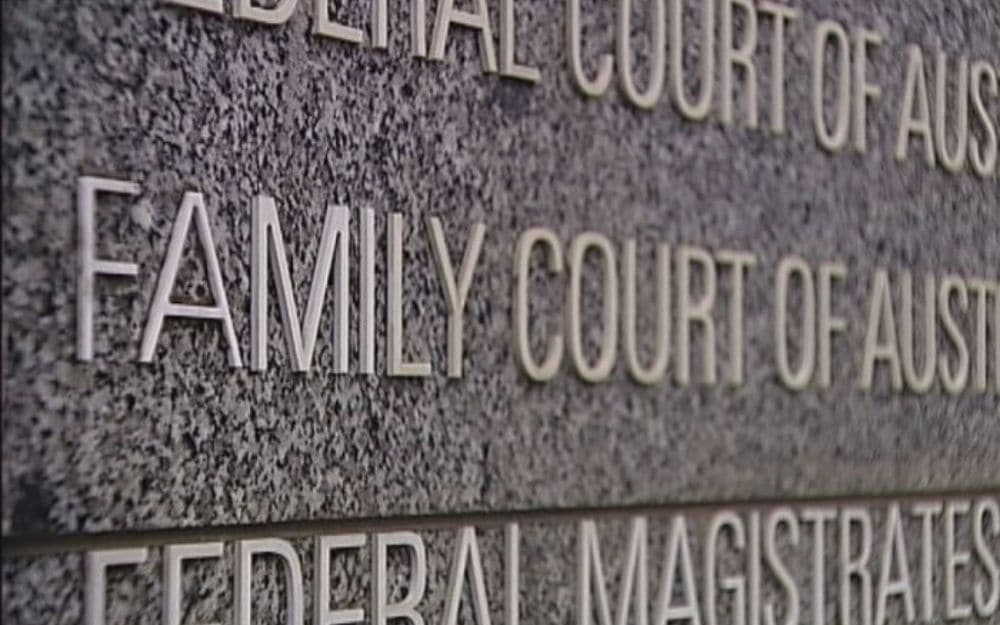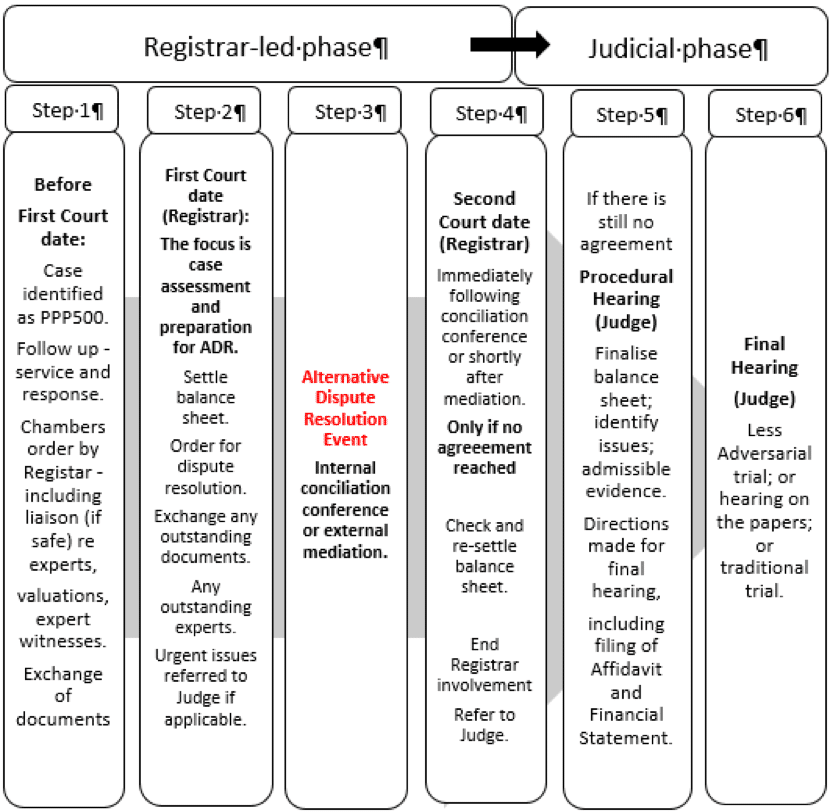
Did you know that there is an alternative to litigation when it comes to resolving your property settlement matters? In this video, OMB Solicitors Partner Abbi Golightly talks about arbitration.

Did you know that there is an alternative to litigation when it comes to resolving your property settlement matters? In this video, OMB Solicitors Partner Abbi Golightly talks about arbitration.

In this video, OMB Solicitors Partner Abbi Golightly shares some of the key changes from the Federal Circuit Court merger with the Family Court of Australia, particularly in implementing mandatory pre-action procedures.

In this video, OMB Solicitor Dakota Hallett discusses what the Family Court takes into consideration in a property settlement following separation.

OMB Family Law Partner, Abbi Golightly, is an Accredited Specialist in Family Law and has been since 2009.
So, what does that really mean for you, our clients?
The Queensland Law Society developed a process of assessment and accreditation in the main areas of practice in Queensland, including Family Law. The QLS operate the Specialist Accreditation Scheme as a method by which to identify those members of the Queensland Law Society who have demonstrated a high level of expertise in a particular area of law.
In order to achieve Accredited Specialist status, there are a number of requirements that have to be satisfied to the highest level. First and foremost, the lawyer has to have been practising almost exclusively within the relevant area of law for at least five years. Thereafter they must pass the stringent assessment program offered by the QLS.
This assessment process involves interviews, exams and submitting examples of work and in order to pass, each discipline must be passed.
Once achieved, Accredited Specialist status is maintained by undertaking a higher level of professional development every year in order to maintain a level of knowledge that is expected of a specialist.
You can identify an Accredited Specialist by the QLS logo that can only be used with the approval of the QLS.
Here at OMB Solicitors, you can see that logo on our website and in our email signatures.
Why does having an Accredit Specialist matter in family law? Family Law is one of the most complex areas of law. It involves traversing many legal disciplines but also involves a skill set of empathy, understanding, compassion, negotiation skills , family law mediation and arbitration.
When you see the Accredited Specialist symbol, you can be confident that your Family lawyers has a skill set that will be applied to help you achieve the best outcome possible in the circumstances. It also means that that skill set is passed on to other members of our family law team, who will be trained by the best in the business also.

On 1 September 2021, the family law courts Federal Circuit and Family Court of Australia will commence operations.
The new court is being touted as an opportunity to change the conversation about family law disputes in Australia. That conversation is focused with great emphasis on dispute resolution (where it is safe to do so) before commencing proceedings and if proceedings are required, ensuring parties are aware of the ramifications for them and their families.
For those families that require judicial intervention, the process is intended to be transparent and more efficient with resolution without undue delay. It is also designed to have a focus on the safe resolution of disputes for vulnerable families, with the increasing rate of family violence in our community prompting that focus.
There will be, for the first time in over 20 years, one single entry point, a single set of rules and forms and case management processes designed to provide a streamlined approach to family law litigation. Whether or not that eventuates, is yet to be seen.
Chief Justice of the Family Court of Australia and the Federal Circuit Court of Australia, the Hon Will Alstergren said that for decades, people in the legal profession, and the wider community, have been calling for change and commenting that the “system” wasn’t working. “The Courts have responded to these calls for change. The Federal Circuit and Family Court of Australia will provide a completely new family law system which focuses on risk, responsiveness, and resolution. There will also be a significant focus on compliance with court orders, demonstrated by the establishment of a new National Compliance List which will also commence on 1 September 2021.”
In response to the increasingly unacceptable delays, the Chief Justice has said that we need to do things differently and the system will identify risk and safety at the very beginning of every case as a priority, where parties will be given ongoing opportunities for dispute resolution where it is safe to so, and if cases cannot be resolved, it will be listed for a trial before a judge much earlier than previously experienced.
The use of Court Registrars and Court-appointed Family Consultants will be integral to the new system to undertake the triage and case management of all matters filed. As far as possible, duty lists will be conducted by Registrars and interim hearings will be conducted by Senior Registrars which is designed to alleviate the front end case management burden on Judges and ensure that they are able to hear and determine trials and deliver judgments in the matters that require judicial attention as quickly and efficiently as possible.
The newly proposed system will see the following time frame for Court events:
To facilitate these changes the Commonwealth Government has provided more than $100 million in new funding. The Courts have now been able to undertake an intensive recruitment drive to secure the services of highly skilled and energised family law practitioners to assist the Courts’ existing hardworking and diligent Registrars and staff. The number of Judges has also been increased to the highest-ever number of Division 2 (or Federal Circuit Court) judges and the highest number of Division 1 (or Family Court) judges since 2007.
Here at OMB solicitors, we are across all of the proposed changes to processes and procedures and will be ready, come 1 September 2021 to embrace the new way of Family Law litigation.
If you have any concerns or queries about how your matter will be managed post 1 September 2021 or discuss any family law matter, contact our Gold Coast Family lawyers on 55550000.

In this video, our Dakota Hallett discusses what happens to the pets in a Family Law Dispute.

Whilst the majority of the legal profession was and remains staunchly opposed to the merger of the Family Court and Federal Circuit Court, the reality is that it will be upon us soon and we must adjust to the new systems in place. It is important also that our clients know the changes that are soon to occur in the system that they may be litigating in, or considering entering.
With thanks to Jacky Campbell at Forte Family Lawyers Gold Coast (published via www.cch.com.au) here are the ten most important things to know about the merger:
To a greater or lesser extent, we are very much in wait and see mode. Watch this space.

In 2021 Australia, pets are without doubt an integral part of the majority of families. With the decision to defer having children until later in life or not at all, couples after separation are often faced with the decision about who gets “custody” of the dog (or cat or both!).
If parties can reach a private arrangement about what happens with the family pet, then that is one thing, but what happens when you can’t?
In a recently published decision of the Federal Circuit Court of Australia in Brisbane, Her Honour Judge Turner has looked carefully at the capacity of the family law courts to determine disputes, on an interim basis about the “custody” of pet dogs.
On 10 February 2021, the Court published Davenport & Davenport (No.2) [2020] FCCA 2766 (8 October 2020) (austlii.edu.au) in which the Court was tasked with deciding a self-represented Husband’s application for an interim “shared custody” arrangement for a dog.
For reasons that we will explore, Her Honour decided there was no jurisdiction to make any such Order.
After a short relationship, during which no children were born, the Wife made an Application for property adjustment Orders under s79 of the Family Law Act. These types of applications fall within the definition of “matrimonial cause” under s4 of the Family Law Act which defines a ‘matrimonial cause” as
Proceedings between the parties to a marriage with respect to the property of the parties to the marriage or either of them, being proceedings (i) arising out of the marital relationship.
The wife, on a final basis, sought to retain possession of the dog, conveniently referred to “D”. There was a dispute between the parties regarding who paid for him etc but that was a matter for a final decision.
Dogs have long been treated by the family law courts as “personal property” which is defined in the Butterworths Legal Dictionary as “all forms of property other than real property; that is all forms of property other than land and interests in land (excluding leaseholds). Personal property is traditionally divided into two classes: chattels real and chattels personal. A “chattel” is a movable possession and can be considered something capable of being the subject of action possession (a “chose” in possession”) or something that cannot be physically possessed but recoverable by a course of action (“a chose in action).
Importantly, as the Wife sought Orders on a final basis regarding possession of the dog, the Court confirmed that it had jurisdiction to hear that final application, but the Husband’s application was an interim one, which brought with it different considerations. The Court considered that the interim application was not one for the adjustment of property interests and did not therefore fall within Part VIIII of the Family Law Act. The Court further relied upon the decision (one of many!) in Strahan and Strahan (interim property orders) within which the Court determined that there must be jurisdiction to make interim property orders before they could be considered.
The Husband did not assist the Court in providing any authority or legislation which addressed whether the Court had jurisdiction to deal with “shared custody” of “D” the dog. The Family Law Act previously referred to “custody” however it pertained to children, the definition of which, obviously does not include dogs. The Application therefore did not fall within the category of interim parenting decisions, which the Court could have entertained.
The Court relied upon the authority of Gaynor & Tseh [2018] FamCA 164 when confirming that the Court had no jurisdiction to make the Orders sought by the Husband. In that authority the Court stated:
Th Family Law Act makes no reference to pets. It was conceded by the applicant that a dog does not fit within any other category of property than a chattel. Hard as that may be for the applicant, and perhaps other dog lovers to accept, the law here concerns the alteration of interests in property. Most significantly, the issue is the question of the alteration of a property interest on an interim basis.
Whilst sympathizing with the Husband and dismissing his application for want of jurisdiction, Her Honour concluded by saying:
The Court is aware that for many people pets are regarded as members of the family however there is no provision under the Family Law Act and no specific legislation that deals with issues such as the “custody” of a pet whether that be a dog, cat, bird, lizard, fish or any of the wonderful creates that we share the planet with that would empower the court to make orders for shared custody of a pet.
The case highlights further why reaching an agreement (which can include matters which otherwise the Court may not permit) is the best outcome for all concerned, including your dog! Contact Gold Coast family lawyer for your free preliminary discussion about your family law issues (pet-related or otherwise).

The focus of articles such as those in the Courier Mail regarding the separation of Wally and Jackie Lewis draws attention to factors that have long been replaced in the Family Law system – see Wally Lewis: Secret betrayal that tore Lewis family apart | The Courier Mail.
References to alleged affairs of long or short-term duration are a constant factor in any reporting of celebrity divorces. And the reality is, is that from a legal perspective, these factors are irrelevant, but for selling your gossip magazines it’s a different story.
Prior to 1975 in Australia, should you wish to get divorced, you would have had to establish one of 14 grounds included into the Matrimonial Causes Act, these include:
Gaining evidence of any of the divorce grounds was a cloak and dagger exercise, involving private investigators and other covert methods. This fault base or moralistic approach was deeply rooted in the religious principles underpinning marriage in that era.
However, come the 1960’s those moralistic and religious viewpoints had become out of sync with modern Australia.
A huge groundswell movement emerged in the 1960’s which shifted the viewpoint on marriage and during this time the increasing numbers of defacto couples increased also.
Fast forward to 1972 the then Whitlam Government introduced a series of reforms including those proposed to the laws pertaining to divorce and “custody” as it was then known as.
In 1975 the Family Law Act was passed into law, with a firm majority of votes (80-41). The Family Law Act introduced “no fault” divorce and boy did Australian’s take to the changes. A massive surge in divorce applications occurred after the passage of the Family Law Act and the court has effectively been swamped since that day.
In order to obtain a divorce pursuant to the Family Law Act, all that is required to be established is that the marriage has “irretrievably” broken down for a period of 12 months prior to the application being made. The Court does have to consider whether or not appropriate arrangements are in place for children under the age of 18 as part of the consideration of the divorce Application.
Conduct issues in family law are mostly irrelevant. There are but a few exceptions to this standard position. Whilst it is entirely understandable that the reasons for the end of your relationship have a massive emotional impact, as your advisor, it is our job to ensure that your matter is conducted in a way that complies with the case authorities and relevant legislation.
So in 2021, your divorce application will look dramatically different to how it would have pre-1975, remembering that an Application for Divorce is an entirely different legal process to the division of assets and reaching an agreement, however again fault or conduct issues become relevant in limited circumstances.
Strategic and resolution-focused advice is what OMB Family Law, the top-rated firm of Family Lawyers Gold Coast, is all about. If there are relevant conduct issues that will impact the division of your assets or the living arrangements for your children, then we will provide you with clear advice on how those issues are relevant and the impact they will have.
Contact Gold Coast Divorce Lawyer on 5555 0000 or via our website www.omb.com.au for a free initial discussion with OMB Gold Coast lawyers.

In this video, OMB Solicitors’ Partner & Accredited Family Law Specialist, Abbi Golightly discusses what the Binding Child Support Agreement is.

In this video, OMB Solicitors’ Partner and Family Law Accredited Specialist, Abbi Golightly discusses what is required in order to participate in Mediation also known as Family Dispute Resolution.
Hi, I’m Abbi Golightly from OMB Solicitors.
Prior to bringing an application to the court for parenting orders, there is a requirement under the Family Law Act to participate in family law mediation, also known as family dispute resolution. There are, of course, exceptions to the requirement to participate in family dispute resolution, including circumstances of urgency, risk of harm, circumstances involving family violence, and abuse of either parent or the child.
However, barring any of the exceptions to the requirements applying to your circumstances, it will be necessary for you to participate in family dispute resolution.
Family dispute resolution providers are approved by the federal government to be appropriately qualified to undertake mediations between parents, and if an agreement is unable to be reached, they will issue you with a Section 60I Certificate, which is a reference to the Family Law Act requiring you to participate in mediation.
That certificate will say that you have attempted mediation and were unable to reach an agreement, or that you have been unable to participate in mediation because of the other parent refusing to participate, or that your circumstances are such that mediation is not appropriate.
It is only after you’ve received a certificate or an exemption from the court that you can bring an application for parenting orders. The requirement to mediate is the federal government’s push to have parents reach an agreement privately in relation to the living arrangements for their children, rather than approaching the court without first doing everything they can to reach an agreement which statistically has the best chances of success for the parents and most importantly, for the children.
At OMB Solicitors, we can assist you in relation to attending a family dispute resolution and advising you about the best options available to you in relation to private mediation, publicly funded mediation and what is the appropriate position to take when negotiating the living arrangements for your children.
If you want to learn more about family law mediation and how our family lawyers Gold Coast team can assist you, contact us today.

In this video, OMB Solicitors Partner & Accredited Family Law Specialist, Abbi Golightly discusses what you need to know if your child is not returned to your care!

In this video, OMB Solicitors Partner & Accredited Family Law Specialist, Abbi Golightly discusses the things you need to consider before separation.

In this video, OMB Solicitors Partner and Accredited Family Law Specialist, Abbi Golightly explains what you need to know about Parenting Plan.

In this video, Partner & Accredited Family Law Specialist, Abbi Golightly discusses what’s involved in changing a child’s name following separation.

But statistically, this is not always the case for families under stress. The period immediately preceding Christmas and post-Christmas often causes such stress that pre-existing problems are brought to the surface and relationships often end.
The desire for a fresh start in the New Year or just getting through “one more Christmas” often prompts parties to consult with Gold Coast Family Lawyers regarding separating before or after the holiday period.
If you have separated, it is very important that as parents, we shield our children from as much of the adult issues as we can. Children observe and take in much more than we give them credit for. They pick up on stress and conflict through observations of actions, moods, and direct conflict.
When it comes to children’s arrangements, the Court’s will always make an Order which it considers to be in the child’s best interests.
Whether this is sharing Christmas Day or alternating it between parents is entirely subject to the individual aspects of each case.
OMB Family Law’s gift to you is our “helpful holiday hints” – namely some things to consider in the lead up to the festive season and when you are discussing and hopefully agreeing on the arrangements for your child or children and other family law matters this holiday period:
From the OMB Solicitors to yours, may your holiday season bring you happiness (or at least as little conflict as possible), rest, and relaxation?
Our office is open until 23 December 2020 for any family law issues that may arise prior to Christmas and is available for urgent issues over the holidays.

If I had a dollar for every time I had heard that in the years since Binding Financial Agreements became part of the Family Law landscape in Australia.
One of the major protective measures for family law litigants proposing to sign a Binding Financial Agreement is the requirement for them both to have received independent legal advice prior to signing the agreement. This advice must truly be independent.
This requirement is provided for in the Family Law Act (the ‘Act”). The advice that is required to be given by a party’s lawyer is specifically about:
If this advice is not given, then a BFA can be declared not binding upon the parties.
A very clear example of the effect of failing to receive such independent advice is the case of Purdey & Millington [2018] FCCA 213 – see full decision here
In this matter:
The Wife asserted that she did not receive appropriate independent legal advice despite the document certifying that the requisite legal advice was provided.
The Wife’s case was that, after having some informal discussions, she went with the Husband to his Solicitor on 16 September 2014, to draw up what she believed to a separation agreement but that it was only to deal with some aspects of their property settlement not all of them. She believed that in Australia, you had to sign papers with a Solicitor to be considered formally separated.
After the meeting with the Husband’s Solicitor, the Husband then took the Wife to a meeting with a Solicitor who had been arranged for her.
The Husband asserted he took the Wife to the Solicitor as she “didn’t know how to get there”.
The Wife asserted that the Husband was present during the meeting with her Solicitor, which the Husband denied (saying he only came in at the start and at the end).
The Husband agreed that he paid for the Wife’s legal advice.
During her evidence, the Solicitor for the Wife stated as follows:
The Court found that the Wife’s Solicitor who was by then not practicing, was not a witness of truth for the following reasons:
Ultimately the Court found that the Wife had displaced the inference which could be drawn by the certificate annexed to the Financial Agreement and held:
The Court referred the matter back for resolution through the usual litigation process.
This case highlights the utmost importance of obtaining proper and independent advice prior to signing a Binding Financial Agreement.
Best case practice requires that there be a number of discussions between a party and their lawyer prior to signing a Binding Financial Agreement and further that the independent legal advice be given in writing and acknowledged by the client as having been received. This is particularly important when the circumstances of the agreement are such that the client is being advised not to sign the document. This practice is adopted irrespective of the manner in which the matter was referred to the family law team at OMB Solicitors.
Whilst this practice may seem unnecessary when parties are in agreement as to their property settlement, it is done to ensure that the Binding Financial Agreement is considered as binding as possible.
To ensure that your Binding Financial Agreement complies with all relevant legislative requirements and that you receive proper and independent legal advice, contact our Gold Coast Family Lawyers team for advice.


It is a specialist list designed for matters where the net assets of the parties including superannuation is or is likely to be less than $500,000. Additionally, there must not be any Trusts or Corporate Structures which would require expert investigation and the matter cannot involve any other aspect of Family Law, such as parenting or child support issues.
Close monitoring and scrutiny will be had of compliance with orders for disclosure and valuation with a focus on reducing delays and provide the parties with expanded opportunities to take ownership of their dispute resolution.
The two phases of the PPP500 proceed, in a general sense as follows:
In the PPP500, the usual requirement for filing of an Affidavit and Financial Statement is dispensed with, resulting in the costs to commence proceedings being greatly reduced. There is a specific PPP500 Financial Summary document which is to be filed at the time of filing the Application or Response.
Stages 1 – 4 set out above are expected to be completed within 90 days of filing where possible and the trial process is expected to be conducted promptly and if possible without the need for traditional trial (which results in delays).
The process is expected to and has to date, produced expeditious and effective results in matters which are simple and have asset pools which are not conducive to lengthy delays in the Court system which would result in the asset pool being eroded by significant legal fees.
Of course the process requires practitioners and parties who are focused on resolution and focusing on the big picture rather than the small minute details.
Our Family Lawyers Gold Coast at OMB Solicitors have focused on prompt and efficient resolution of matters which result in parties exiting the Family Law system without lengthy delays. With strategic and pragmatic advice we will guide you through your property settlement matter and recommend the use of the PPP500 where appropriate and necessary.

In August 2020, the Family Law Courts (the Family Court and Federal Circuit Court) launched The Lighthouse Project, being piloted through a handful of Registries, of which Brisbane is one.
It is the Court’s recognition that the intersection between Family Violence and the Family Law system is complex and requires specific and detailed attention.
The Lighthouse Project is a screening and management program to assess risk to families within the system and having a focus on improving outcomes for families in the family law system.
When an Application for Parenting Orders is filed through the online court portal, the parties will be asked to complete a confidential and secure questionnaire via the Family DOORS Triage.
The Family DOORS Triage system has been specially designed for Family Law and considers a range of safety risks that arise frequently in family law matters. The answers to the questionnaire are referred to a highly skilled team of family counsellors who will assess risk as being HIGH, MEDIUM and LOW risk.
High-Risk cases will be referred for immediate action through a video, telephone or face to face conference with a family counsellor. The Counsellor will provide a detailed risk assessment, safety and wellbeing plan for the person and referrals to appropriate support services.
Medium Risk cases will be offered safety planning and service referrals and will be considered for a range of case management pathways based on the individual needs of the case.
Low-Risk cases will be processed through court-ordered dispute resolution.
After assessment through the Family Doors Triage system, the matter will be dealt with by a dedicated team of highly skilled professionals including registrars, family consultants and support staff with specialized training in family safety risks and family violence.
Those families assessed as being High Risk and most vulnerable will have their matter managed through the Evatt List which focuses on early information gathering and intervention, through a judge-led support team. This team will have specialized training and experience in working with families who are at high risk.
Why The Lighthouse Project?
It is the Court’s response to calls for the family law system to deal with family violence and risk better. These calls have been made in a number of reports and commissions over the last 10 years.
It is a detailed and dedicated response to a growing crisis in our community, with statistics showing that women, men and children are at increased risk of death or injury at the hands of their partner or parent.
How can Gold Coast Family Lawyers help?
When taking instructions from you, concerns about family violence and risk of abuse and harm are discussed such that we can assess the best way to proceed with your matter. Upon receiving instructions from you to commence proceedings we will work with you to complete the necessary screening questionnaire through The Lighthouse Project and be with you every step of the way through your parenting matter. Our Gold Coast Family Lawyers here to help you.